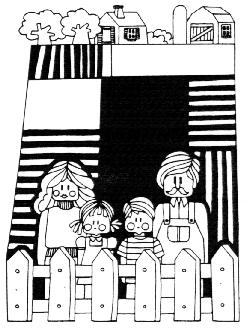
S-85
Purdue University
Cooperative Extension Service
West Lafayette, IN 47907
Dressing Up the Farm Family
Bill Field, Extension Safety Specialist
Jean Goodrick, Extension Textiles Specialist
Purdue University
One of the most frustrating responsibilities facing many farm wives is
keeping each family member properly clothed. The unique tastes of
individual members usually require that special attention be given to
style, color and comfort as well as durability and
washability. However, one aspect that is often overlooked concerns
the personal safety of the wearer. Inappropriate or poorly maintained
clothing has contributed to numerous personal injuries on Hoosier
farms. The following case histories identify just a few.
* A teen-age boy on a northern Indiana farm was helping unload corn
into a portable auger. When he inadvertently got too close to the
spinning auger, the untied lace of his workboot became entangled. His
leg was pulled into the auger and severed.
* Several small children of one Indiana farm family were taken to the
doctor for treatment of skin rashes. It was determined that the
children's underclothing had become contaminated with pesticides when
those garments were washed with the clothing worn by their father when
he was applying farm chemicals.
* A farm wife was helping her husband dig fence posts with a tractor
mounted auger. The hood of her parka became entangled in the
power-take-off shaft, and she was injured severely before her husband
could shut off the tractor.
* Another Indiana farmer went to his doctor complaining of severe
headaches and dizziness. After several tests it was discovered that the
sweat band of his "seedcorn" cap had become contaminated with
pesticide. Unknowingly, he was exposing himself to the chemical
every time he wore the hat.
Taking a few minutes to check the clothing worn by family members as
they leave each morning for work, school, or play will help keep them
healthy and safe. Use the following seasonal checklist as a guide.
SPRING
____ layered clothing to allow for adjustment to changing temperature
____ rain gear to keep inner clothing warm and dry
____ heavy duty workshoes when doing farm work
____ eye protection available and worn during application of anhydrous
ammonia
____ long-sleeve shirt or coveralls, rubber gloves, rubber boots and
chemical goggles when handling or applying pesticides
____ shoes or boots worn when horse riding
SUMMER
____ adequate coverage of skin to prevent overexposure to the sun
____ hearing protection from excessive machinery noise
____ reflective clothing worn when walking or biking on the highway at
night.
____ shirttails tucked in
____ pant cuffs free from excessive frays
____ helmet worn when motorcycle riding
____ personal flotation devices worn when boating
FALL
____ clothing free of loose threads or buttons, broken zippers or
dangling strings
____ wrist jewelry, rings and neck chains removed or covered
____ highly visible clothing worn when hunting
____ non-flammable clothing worn when burning leaves or exposed to
open flames
WINTER
____ warm hat to conserve body heat and protect ears from cold
____ windproof coveralls or snowmobile suits worn when exposed to the cold
for long periods
____ neck scarfs tucked inside jacket
____ non-slip footwear to prevent slips and falls
____ warm, dry gloves to protect from frostbite
Proper care and maintenance, as well as choice of clothing appropriate
for the job or activity, figure strongly in the farm family's
well-being.
Keep Clothes in Good Repair: Open jackets, flapping sleeves,
loose hems and frayed edges can be hazardous.
Replace missing buttons or broken zippers
Secure loose hems, especially at the bottom of sleeves and pant legs.
Refinish frayed edges.
Keep Clothes Clean: Garments that are dusty, dirty, soaked with
oil or solvent, or contaminated with chemicals can cause skin rash or
disabling dermatitis. Because pesticides can enter the body through
the skin, careful handling of garments contaminated by drifts or
spills is required.
Clothes worn while mixing and applying chemicals should be washed
after each wearing.
Do not mix contaminated clothes with other laundry; they should go
right into the washer for laundering as soon as they are removed, or
into a plastic bag to await laundering.
Use laundry procedure (Recommended procedure based on results of a
study conducted at Iowa State University) normally used heavily soiled
clothing:
* Use hot water which is at least 140°F.
* Use full water level, even for a small wash load.
* Use manufacturer's recommended amount of heavy-duty detergent. A
laundry product with an ingredient that ties up water hardness
minerals in a soluble form (phosphate or sodium nitrilotriacetate) is
preferred.
* The addition of one-half cup household ammonia OR chlorine
bleach (not both) could enhance cleaning action.
* Dry clothes thoroughly in an automatic dryer for 30 minutes at the
regular fabric setting.
* Remove any left-over pesticide from the washer by running the machine
through a complete wash cycle, with detergent but without clothes.
In the event of a concentrated spill, get clothing off immediately and
wash the affected area with plenty of soap and water. Garments
contaminated with the concentrated pesticide should be washed several
times or even discarded.
NOTE: Some chemicals may require more specialized treatment of
laundry than outlined above. Be sure to read product label
information, and observe all handling instructions.
R 4/85
Cooperative Extension work in Agriculture and Home Economics, state of
Indiana, Purdue University, and U.S. Department of Agriculture
Cooperating; H.A. Wadsworth, Director, West Lafayette, IN. Issued in
furtherance of the acts of May 8 and June 30, 1914. The Cooperative
Extension Service of Purdue University is an affirmative action/equal
opportunity institution.

